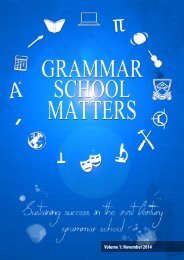Volume 1: November 2014
Create successful ePaper yourself
Turn your PDF publications into a flip-book with our unique Google optimized e-Paper software.
Nicola Rorke<br />
With the recent changes<br />
in the GCSE sciences, the<br />
assessment of quality of written<br />
communication has come to<br />
the fore. Regular opportunities<br />
are therefore given in KS3<br />
Science to practise written<br />
communication by completing<br />
extended writing tasks.<br />
One such task is part of a<br />
short module followed by Year<br />
8 which focuses on the role<br />
of zoos in conservation and<br />
education. The module starts<br />
with a trip to Paignton Zoo so<br />
that the students can experience<br />
the work of the zoo firsthand.<br />
They also attend a talk<br />
explaining why some species<br />
are under threat from human<br />
SMSC IN KS3<br />
SCIENCE<br />
activities and the projects<br />
that zoos are undertaking to<br />
help conserve them. The talk<br />
gets them thinking about the<br />
everyday products that they<br />
use such as mobile phones,<br />
cosmetics, detergents and foods<br />
– exploring how this links to<br />
sustainable living and loss of<br />
habitats.<br />
On returning to school, students<br />
are given the task of writing an<br />
essay entitled ‘Zoos; good or<br />
bad?’ They must also include<br />
key words that are linked<br />
to SMSC ideas. Essays are<br />
assessed on structure, spelling,<br />
punctuation, grammar, use of<br />
SMSC key words (underlined)<br />
and the ability to provide a<br />
balanced argument as well as<br />
conclude their writing with<br />
their own personal viewpoint.<br />
The students provide some<br />
excellent pieces of writing and<br />
really enjoy the opportunity<br />
to put forward their own ideas<br />
with many varied points of view.<br />
SMSC IN KS5<br />
BIOLOGY<br />
There are many opportunities<br />
in Key Stage 4 for students to<br />
explore controversial topics<br />
in Biology and debates are<br />
commonplace. It is a shame that<br />
with the current course content,<br />
Biology at A-level remains more<br />
traditional in its approach and<br />
it is often harder for students to<br />
discuss and explore topics that<br />
lend themselves to SMSC. In<br />
addition, many of our students<br />
now face the challenge of<br />
interviews for medical schools<br />
where they are asked to present<br />
ideas through role-play. As part<br />
of our tutorial programme, we<br />
deliver a number of role-play<br />
activities. We make it explicit<br />
that they are extension tasks,<br />
ABOVE<br />
An extract from one of the essays<br />
Miles Smith<br />
but it is rare that individuals<br />
don’t engage fully. The debates<br />
are managed by the students<br />
and the teacher merely has an<br />
observation role so they can<br />
assess SMSC strands. Often we<br />
will comment on the student’s<br />
progress in UCAS references.<br />
In terms of student voice and<br />
review, it is common that these<br />
are rated the highest out of all<br />
our Biology activities. Here<br />
are two case studies showing<br />
how we take time from the<br />
curriculum to focus on roleplay:<br />
Exploring the difficulties in<br />
controlling Malaria, HIV and<br />
1 TB in Sub-Saharan Africa<br />
Students read the background<br />
rates of the three diseases in a<br />
fictitious city before taking the<br />
role of a non-governmental aid<br />
organisation in planning aid for<br />
the next three years. Students<br />
then planned a yearly million<br />
pound budget using a budget<br />
sheet (left) and allocated the<br />
funding.<br />
continued overleaf...



